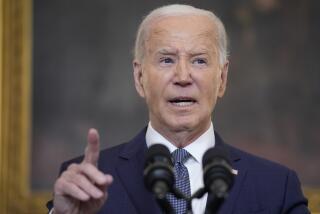U.S. Presents New Arms Plan; Talks to Be Extended
- Share via
GENEVA — The United States put a new arms control plan on the table at Geneva today, and the Soviet Union agreed to extend the present round of arms talks by nearly a week to examine the plan before the U.S.-Soviet summit.
U.S. research into a space-based missile defense, the Strategic Defense Initiative, still appeared to be a major sticking point in the talks, however.
In Moscow, two military analysts for the official Soviet news agency Tass said today that President Reagan’s new arms control offer appears to be little more than an “old commodity in a new wrapping.”
The Novosti news agency said nothing “constructive” is added “to the American approach to arms control by the proposals made in Washington. . .Its attitude to the SDI has not altered--it is clear from the proposals that work on the SDI will continue.”
A letter from Reagan to Soviet leader Mikhail S. Gorbachev was delivered in Moscow today outlining the proposals, a senior U.S. official there said. The official, who insisted on anonymity, said there was no immediate response.
Reagan and Gorbachev are to meet in Geneva on Nov. 19-20.
2 Fruitless Rounds
The Geneva arms talks started off with two apparently fruitless rounds, but in this round, both sides proposed large cuts in offensive nuclear arsenals.
A month ago, the Soviets made a proposal that included 50% reductions in nuclear forces capable of reaching each other’s territory and a ban on space weapons.
The United States responded today with a proposal that Reagan said calls for “deep cuts” in offensive weapons, research on defensive systems and “no cheating.”
The U.S. negotiating team, headed by Max M. Kampelman, presented the plan at a two-hour meeting at the Soviet mission to the United Nations.
Chief Soviet negotiator Viktor P. Karpov said before the meeting that progress on arms control before the summit would depend on the Americans.
Karpov said SDI, dubbed “Star Wars,” was “a main obstacle to deep reductions in nuclear weapons.”
The Geneva talks had been scheduled to adjourn after today’s meeting, but the two sides agreed today to extend the current round until next Thursday, U.S. spokesman Terry Shroeder said. He declined comment when asked how many sessions would be held.
More to Read
Sign up for Essential California
The most important California stories and recommendations in your inbox every morning.
You may occasionally receive promotional content from the Los Angeles Times.













